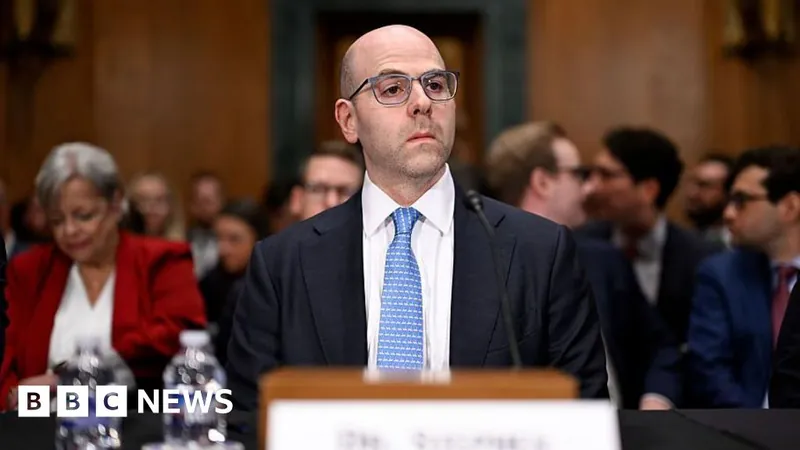
Alzheimer's Breakthrough: New Drugs Bring Hope but with Dangerous Risks
2025-09-17
Author: Sophie
A Dreaded Diagnosis Turns to Hope
For neurologist Anelyssa D'Abreu, revealing a diagnosis of early-stage Alzheimer's used to be one of the hardest conversations to have with her patients. But now, when they ask if there’s anything they can do, she can respond with a flicker of hope: "Perhaps."
A New Class of Medications Emerges
Unlike just a decade ago, the landscape of Alzheimer's treatment is shifting as innovative drugs emerge that may slow the progression of this devastating disease. These anti-amyloid therapies offer promise but come with serious trade-offs, including potential brain bleeds and other severe side effects.
Breakthroughs & Controversies in Research
Anti-amyloid therapies have faced scrutiny, despite showing in limited trials that they can slow the buildup of amyloid beta in the brain—an early marker of Alzheimer’s. Collectively, nearly four dozen studies since 2018 suggest these medications could provide an extra year of functional independence, but the success of these treatments is clouded by critical concerns regarding their safety and efficacy.
Risk vs. Reward: A Balancing Act
D'Abreu, head of the cognitive and behavioral neurology division at the University of Virginia, initially hesitated to offer these treatments due to the alarming rates of adverse effects reported, such as brain swelling or microbleeds. Yet, recognizing the importance of independence for her patients, she now feels compelled to provide this option. Among the 50 patients treated in her facility, none have suffered severe complications.
The Living Impact of Alzheimer's
With around 7.2 million Americans over the age of 65 living with Alzheimer's, the urgency for effective treatments is palpable. Historically, amyloid beta plaques form long before symptoms manifest, making early intervention crucial. In 2021, the FDA fast-tracked the anti-amyloid drug aducanumab, raising hopes that it could halt disease progression, but the drug was withdrawn less than three years later due to disappointing outcomes.
The Next Generation of Treatments
Since the controversial journey of aducanumab, two more anti-amyloid treatments—lecanemab (Leqembi) and donanemab (Kisunla)—have entered the scene, each improving cognitive decline over its predecessor. However, these options still present risks for serious complications. The average annual costs for these therapies hover around $26,500 for lecanemab and $32,000 for donanemab.
Selecting Suitable Candidates
Not every Alzheimer's patient is a fit for these therapies; they are generally reserved for those in the early stages of the disease. Extensive evaluations are needed to determine eligibility, including costly imaging and genetic tests.
Skepticism and Caution from Experts
Despite some neurologists like Judith Heidebrink advocating for the potential benefits—indicating that those on these therapies generally maintain higher levels of independence—skepticism remains prevalent, with many experts questioning the drugs' efficacy and potential risks.
Real-Life Stories of Patients' Battles
Take Bob Merriman, for example. At 80, he had seen his family ravaged by Alzheimer’s and was determined to avoid the same fate. After considering the significant risks, he chose to undergo biweekly infusions of lecanemab, showing signs of improvement in focus and functionality.
A Paradigm Shift in Neurology
As the medical community navigates these challenges, the conversation around anti-amyloid therapies is evolving. More neurologists are beginning to discuss these treatments with their patients, reflecting a shift in the landscape of Alzheimer's care.
The Future of Alzheimer's Research
Current research continues to explore whether earlier intervention with anti-amyloid therapies might delay or prevent the onset of Alzheimer's altogether. Trials are underway to better understand the drugs' long-term effects and potential as a preventative measure.
Cautious Optimism in the Field
Though many neurologists are still approaching these therapies with caution, there is hope that ongoing studies will yield clearer answers on their safety and efficacy, potentially transforming the lives of patients grappling with Alzheimer’s disease.









 Brasil (PT)
Brasil (PT)
 Canada (EN)
Canada (EN)
 Chile (ES)
Chile (ES)
 Česko (CS)
Česko (CS)
 대한민국 (KO)
대한민국 (KO)
 España (ES)
España (ES)
 France (FR)
France (FR)
 Hong Kong (EN)
Hong Kong (EN)
 Italia (IT)
Italia (IT)
 日本 (JA)
日本 (JA)
 Magyarország (HU)
Magyarország (HU)
 Norge (NO)
Norge (NO)
 Polska (PL)
Polska (PL)
 Schweiz (DE)
Schweiz (DE)
 Singapore (EN)
Singapore (EN)
 Sverige (SV)
Sverige (SV)
 Suomi (FI)
Suomi (FI)
 Türkiye (TR)
Türkiye (TR)
 الإمارات العربية المتحدة (AR)
الإمارات العربية المتحدة (AR)